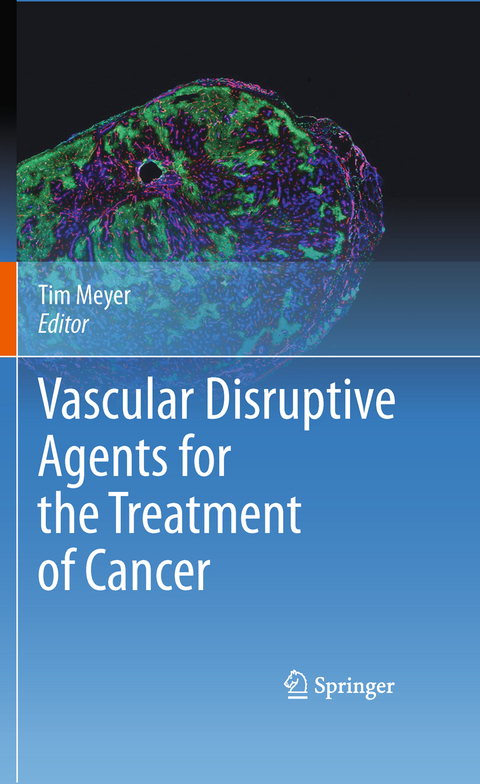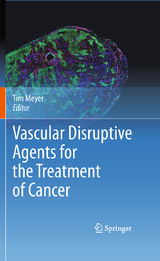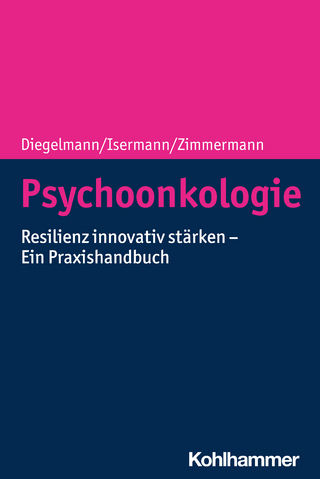Vascular Disruptive Agents for the Treatment of Cancer
Springer-Verlag New York Inc.
978-1-4419-6608-7 (ISBN)
Angiogenesis (formation of new vessels from pre-existing ones) is a crucial early event in the process of tumor development. New vessels supply the tumor with nutrients that are needed for further local growth and enable distant metastases (Folkman 1995). Judah Folkman (1971) highlighted the potential therapeutic imp- cations of tumor angiogenesis. He hypothesized that if tumor angiogenesis is inhibited, then tumor growth and metastasis will be impaired greatly or even impossible. The subsequent quest for endogenous and exogenous inhibitors of angiogenesis has yielded a variety of promising therapeutic agents that block one or more angiogenic pathways, a few of which have been approved by the FDA (e. g. , bevacizumab, sorafenib, sunitinib) for use as single agents or in combination with chemotherapy in specific populations of cancer patients (Sessa et al. 2008). There has also been a dramatic expansion in the exploration of novel anti-angiogenic agents pre-clinically and in clinical trials (Ferrara 2002). Some of the most promising data comes from the development of agents that inhibit one of the key growth factors involved in tumor angiogenesis – vascular endothelial growth factor (VEGF) (Ferrara et al. 2003). Bevacizumab is a monoclonal antibody against VEGF that was the first an- angiogenic agent that improved significantly the overall survival of patients with colorectal and non-squamous non-small cell lung cancer (Ferrara et al. 2005). Various agents that target tumor angiogenesis are currently under investigation in different cancer types in many clinical trials (Ferrara and Kerbel 2005).
Dr. Tim Meyer is a Senior Lecturer in Medical Oncology at the UCL Cancer Institute in London where he specialises in gastrointestinal cancers and drug development. He trained in medicine at UCL and obtained his PhD from London University, after which he completed specialist training in medical oncology. His major research focus is antibody-based vascular targeting.
Development of Vascular Disrupting Agents.- Development of Vascular Disrupting Agents.- Pre-Clinical Development.- The Discovery and Characterisation of Tumour Endothelial Markers.- The Use of Animal Models in the Assessment of Tumour Vascular Disrupting Agents (VDAs).- Combination Therapy with Chemotherapy and VDAs.- Lessons from Animal Imaging in Preclinical Models.- Combining Antiangiogenic Drugs with Vascular Disrupting Agents Rationale and Mechanisms of Action.- Imaging in the Development of Vascular Disruptive Agents.- MRI to Assess Vascular Disruptive Agents.- Contrast Ultrasound in Imaging Tumor Angiogenesis.- Clinical Development.- The Clinical Development of Tubulin Binding Vascular Disrupting Agents.- ASA404 (DMXAA): New Concepts in Tumour Vascular Targeting Therapy.- Vascular Disruptive Agents in Combination with Radiotherapy.
| Zusatzinfo | IX, 256 p. |
|---|---|
| Verlagsort | New York, NY |
| Sprache | englisch |
| Maße | 155 x 235 mm |
| Themenwelt | Medizin / Pharmazie ► Medizinische Fachgebiete ► Onkologie |
| Medizin / Pharmazie ► Medizinische Fachgebiete ► Pharmakologie / Pharmakotherapie | |
| Medizin / Pharmazie ► Studium | |
| ISBN-10 | 1-4419-6608-0 / 1441966080 |
| ISBN-13 | 978-1-4419-6608-7 / 9781441966087 |
| Zustand | Neuware |
| Haben Sie eine Frage zum Produkt? |
aus dem Bereich




